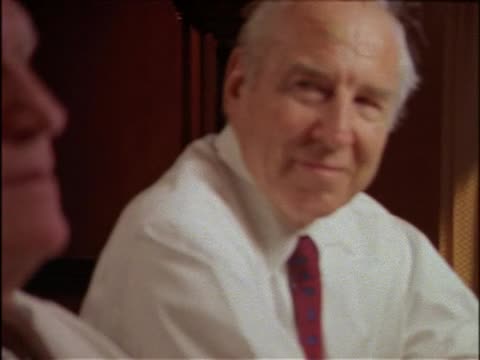NOVA; To the Moon; Interview with James "Jim" Lovell, Frank Borman, and William "Bill" Anders, astronauts on the Apollo 8 mission, part 1 of 2
- Series
- NOVA
- Episode
- To the Moon
- Producing Organization
- WGBH Educational Foundation
- Contributing Organization
- WGBH (Boston, Massachusetts)
- AAPB ID
- cpb-aacip-15-4j09w0b245
If you have more information about this item than what is given here, or if you have concerns about this record, we want to know! Contact us, indicating the AAPB ID (cpb-aacip-15-4j09w0b245).
- Description
- Program Description
- This remarkably crafted program covers the full range of participants in the Apollo project, from the scientists and engineers who promoted bold ideas about the nature of the Moon and how to get there, to the young geologists who chose the landing sites and helped train the crews, to the astronauts who actually went - not once or twice, but six times, each to a more demanding and interesting location on the Moon's surface. "To The Moon" includes unprecedented footage, rare interviews, and presents a magnificent overview of the history of man and the Moon. To the Moon aired as NOVA episode 2610 in 1999.
- Raw Footage Description
- Jim Lovell, Frank Borman, and Bill Anders, former NASA astronauts who served on the Apollo 8 mission, are interviewed about their time on Apollo 8, including their shared toothbrush and meeting with Charles Lindbergh on the day before the launch. The Apollo 8 change of mission and the secrecy around it is also discussed, as are medical issues like Borman's sickness and Anders' inability to sleep during the mission. The crew jokes about issues that were made during Apollo 8, and the tape ends with a segment with the missing introduction from part one of this tape.
- Created Date
- 1998
- Asset type
- Raw Footage
- Genres
- Interview
- Topics
- Technology
- Science
- History
- Subjects
- Gemini; astronaut; Space; American History; apollo; moon
- Media type
- Moving Image
- Duration
- 00:28:36
- Credits
-
-
Producing Organization: WGBH Educational Foundation
- AAPB Contributor Holdings
-
WGBH
Identifier: cpb-aacip-c97c8ccc937 (Filename)
Format: Digital Betacam
Generation: Original
Duration: 0:28:36
If you have a copy of this asset and would like us to add it to our catalog, please contact us.
- Citations
- Chicago: “NOVA; To the Moon; Interview with James "Jim" Lovell, Frank Borman, and William "Bill" Anders, astronauts on the Apollo 8 mission, part 1 of 2 ,” 1998, WGBH, American Archive of Public Broadcasting (GBH and the Library of Congress), Boston, MA and Washington, DC, accessed February 16, 2026, http://americanarchive.org/catalog/cpb-aacip-15-4j09w0b245.
- MLA: “NOVA; To the Moon; Interview with James "Jim" Lovell, Frank Borman, and William "Bill" Anders, astronauts on the Apollo 8 mission, part 1 of 2 .” 1998. WGBH, American Archive of Public Broadcasting (GBH and the Library of Congress), Boston, MA and Washington, DC. Web. February 16, 2026. <http://americanarchive.org/catalog/cpb-aacip-15-4j09w0b245>.
- APA: NOVA; To the Moon; Interview with James "Jim" Lovell, Frank Borman, and William "Bill" Anders, astronauts on the Apollo 8 mission, part 1 of 2 . Boston, MA: WGBH, American Archive of Public Broadcasting (GBH and the Library of Congress), Boston, MA and Washington, DC. Retrieved from http://americanarchive.org/catalog/cpb-aacip-15-4j09w0b245
